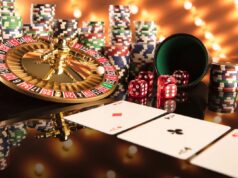
Many people look at professional poker players and think that it is incredibly easy to reach the same heights, just need to get money. This is not the only misconception that is formed in society about fans of this mathematical game. We recommend learning more about poker at britannica.com and later debunking popular myths about poker professionals. This review will help get rid of stereotypes and even introduce some of the nuances of the card game.
Misconceptions About Poker Professionals
Users who run poker online at the amateur level do not always make the right decisions. It is difficult for them to remain calm if the game situation is even slightly different from expectations. Professionals have no such difficulty, as they sensibly assess their chances of winning in the long and the short run. The frequent victories of experienced poker players create many misconceptions, which must now be dispelled.

- An exceptionally mathematical mindset is a guarantee of professionalism. This statement is fundamentally wrong. You don’t need to be a mathematician to win; basic calculations are enough. If you understand the fundamentals of the game, a few seconds are enough to build a successful strategy. Exceptional computational skill is not a prerequisite for playing poker professionally.
- Knowing how to bluff is crucial to the outcome of a game. Having the ability to skillfully mislead your opponents is useful, but the skill offers no guarantees. Through hundreds of games played, discipline, and incredible concentration, professionals learn to identify situations where you can make the most profit. It doesn’t turn game sessions into cheating.
- Poker professionals have to spend a huge amount of their own money. At the highest level of the card game, players invest millions in bets, but it’s not always their money. The professionals are often invested by friends, risk takers, and regular users of betting sites. As a rule, we are talking about the players of the higher tier. They manage their bankroll flawlessly and minimize their own risks, so they receive impressive financial support.
- Learning to play well is enough to move to the professional league. This is just one of the criteria that must be met in order to be considered a poker expert. Only those people who are willing to improve their skills, develop discipline, and learn how to lose for the sake of future victories, become and remain professionals. The ability to resist the pressure of opponents and dealing not in your own favor often teaches you how to win.
- Only men can achieve success in poker. For many years, most of the ranking lists of players have indeed been occupied by members of the stronger gender. This does not mean that women play worse. Every year more women enter the gambling arena, playing at the amateur and professional levels. Their art of the game is not inferior to men’s skills.
- Playing poker is very easy. The game is really not very difficult but the title of professional does not go to players after a winning streak. It is possible to become a poker master after spending a long time with cards in hand, and it is important to remain concentrated when losing, thus taking the next steps thoughtfully.
- The IQ of poker professionals is comparable to that of geniuses. Having outstanding intellectual abilities is not a requirement for success in poker. It is possible to become a professional in a card game, as well as in any other activity if users have an IQ above the average level.

The emergence of card games in the online segment has helped to debunk the main myths about poker professionals. The user with any income and sphere of activity has access to popular types of poker on the Internet. To launch poker and colorful slot machines, gamblers just need to go to Fair Go casino play with any bets.
Theoretical Base of Professional Poker Players
Before your first game of poker, it’s a good idea to learn the rules of the game. The best place to start is with the Texas version of the card game. It is a classic version without a lot of nuances and simple rules. Poker players collect 10 possible combinations, and the owner of the largest hand gets the pot.
| Combination | Formation principle |
| Royal Street Flush | Combination of five highest-ranking cards of the same suit |
| Street Flush | Consecutive connection of five values of same suit |
| Four of a kind | Four of the same card face value |
| Full House | Simultaneous combination of a trey and a pair |
| Flush | Five any card values of one suit |
| Street | Combination of five consecutive values of any suit |
| Set | Three single-ranked cards |
| Pair | Two cards of identical face value |
| Two pairs | Combination of four cards with two pairs in the same face value |
| Higher card | Combination with the lowest odds, brings profit at the leading rank among the opponent’s cards |
To form winning combinations in poker, two closed cards are used, as well as five elements from the main table. The card hands are opened after the last bet is made. Combinations are compared and evaluated according to multipliers. This is the basic knowledge you need to start on the road to becoming a poker pro. The need to understand theory is definitely not a misconception.

Poker is in demand in many countries. The game is played in casinos and on the internet. Thematic championships are regularly held, where lucky skilled poker players demonstrate their skills. The classic variation, Omaha, Dro-poker, Stud as well as Chinese poker, more information about which can be found here, are in demand. In any of these varieties of poker realistic to reach the status of a professional if the time to learn and practice skills in the casino.














